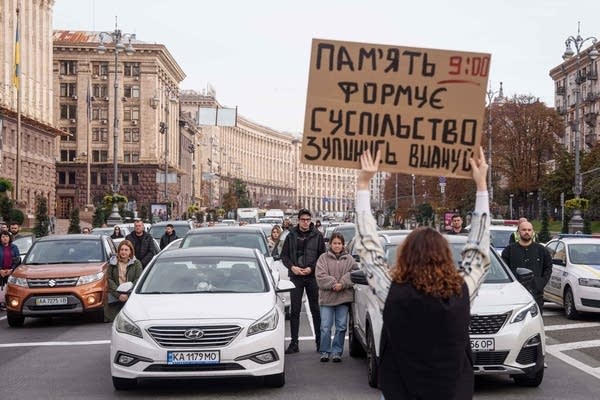একটি জাতি বিরতি দেয়: ইউক্রেনের প্রতিদিনের স্মরণে রাশিয়ান আক্রমণগুলিকে তীব্র করার মাধ্যমে অব্যাহত থাকে

At nine o’clock every morning, the city of Kyiv pauses for one minute. Traffic lights turn red and a steady beat of a metronome over loudspeakers signals 60 seconds of somber reflection. Cars parked in the middle of the street sit idle as drivers step out and stand with heads bowed. Across Ukraine – in cafes, gyms, schools, on television, and even on the front lines – people stop to remember those killed in Russia’s large-scale invasion. Near an outdoor memorial in Kyiv’s Maidan Square, four friends gathered bearing cardboard signs reading “Stop. Honor.” Around them, a dense mosaic of flags, photos, and candles honoring fallen service members formed a testament to grief and pride. These four were connected to Iryna Tsybuk, a 25-year-old combat medic who died in a landmine explosion in eastern Ukraine last year. Her death fueled the national outpouring of grief and added momentum to the daily remembrance initiative. “Memory is not about death,” says Kateryna Datsenko, a friend of the fallen paramedic and co-founder of Vashano, a civic group that promotes the daily observance. “It is about life – what people loved and appreciated and thought about. Someone might have liked to garden, someone probably liked a favorite poem. That’s the memory we’re trying to keep.” The 9 a.m. ritual began in 2022, a few weeks after the start of the invasion, by presidential decree from Volodymyr Zelenskyy. It has since become a common national practice. Even as Russian missile and drone attacks have intensified in recent weeks, striking energy facilities and cities across the country, the public demonstration of solidarity continues. Despite the escalation, Ukrainians still gather each morning to honor those lost in the war. Ihor Reva, deputy head of Kyiv’s military administration, says the ritual fulfills a deep social and personal need. He said: “There is a price to this war, and this price is high: human lives.” “You disconnect from everyday thoughts and just set aside that minute for memory. This is what I call conscious time-keeping.” City officials recently synchronized the traffic lights in Kyiv to turn red at 9 a.m., ensuring the capital joins in the nationwide pause. “Better late than never,” Reva said. “We definitely won’t stop there.” For activist and campaign supporter Daria Kolomiec, the moment feels both collective and intensely personal. “Every day we wake up – sometimes we barely sleep because of the attacks – but every day at 9 a.m. we come together and remember why we are here, and who we need to be grateful to.” “You are not alone in this grief. There is strength in us at this moment.” (Tag for translation) Bangla (Bangladesh) খবর
প্রকাশিত: 2025-10-13 21:33:00
উৎস: www.mprnews.org











